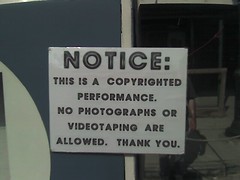Autonomo.us and the Franklin Street Statement on Freedom and Network Services launched today.
I’ve written about the subject of this group and statement a number of times on this blog, starting with Constitutionally Open Services two years ago. I think that post holds up pretty well. Here were my tentative recommendations:
So what can be done to make the web application dominated future open source in spirit, for lack of a better term?
First, web applications should be super easy to manage (install, upgrade, customize, secure, backup) so that running your own is a real option. Applications like WordPress and MediaWiki have made large strides, especially in the installation department, but still require a lot of work and knowledge to run effectively.
There are some applications that centralizaton makes tractable or at least easier and better, e.g., web scale search, social aggregation — which basically come down to high bandwidth, low latency data transfer. Various P2P technologies (much to learn from, field wide open) can help somewhat, but the pull of centralization is very strong.
In cases were one accepts a centralized web application, should one demand that application be somehow constitutionally open? Some possible criteria:
- All source code for the running service should be published under an open source license and developer source control available for public viewing.
- All private data available for on-demand export in standard formats.
- All collaboratively created data available under an open license (e.g., one from Creative Commons), again in standard formats.
- In some cases, I am not sure how rare, the final mission of the organization running the service should be to provide the service rather than to make a financial profit, i.e., beholden to users and volunteers, not investors and employees. Maybe. Would I be less sanguine about the long term prospects of Wikipedia if it were for-profit? I don’t know of evidence for or against this feeling.
Consider all of this ignorant speculation. Yes, I’m just angling for more freedom lunches.
I was honored to participate in a summit called by the Free Software Foundation to discuss these issues March of this year, along with far greater thinkers and doers. Autonomo.us and the Franklin Street Statement (named for the FSF’s office address) are the result of continued work among the summit participants, not yet endorsed by the FSF (nor by any other organization). Essentially everything I conjectured above made it into the statement (not due to me, they are fairly obvious points, at least as of 2008, and others made them long before) with the exception of making deployment easier, which is mundane, and service governance issues, which the group did discuss, but inconclusively.
There’s much more to say about this, but for now (and likely for some time, at the rate I write, though this activity did directly inspire me to propose speaking at an upcoming P2P industry summit, which I will early next month–I’m also speaking tomorrow at BALUG and will mention autonomo.us briefly–see info on both engagements) I wanted to address two immediate and fairly obvious critiques.
Brian Rowe wrote:
“Where it is possible, they should use Free Software equivalents that run on their own computer.” This is near Luddite talk… It is almost always possible to use an app on your own comp, but it is so inefficient. Networked online apps are not inherently evil, should you back up your work
offline, yes. Should you have alternative options and data portability, yes. You should fight to impove them. But you should not avoid them like the plauge.
The statement doesn’t advocate avoiding network services–see “Where it is possible”, and most of the statement concerns how network services can be free. However, it is easy to read the sentence Rowe quoted and see Luddism. I hope that to some it instead serves as a challenge, for:
- Applications that run on your own computer can be networked, i.e., P2P.
- Your own computer does not only include your laptop and home server, but any hardware you control, and I think that should often include virtual hardware.
Wes Felter wrote:
I see a lot about software licensing and not much about identity and privacy. I guess when all you have is the AGPL everything looks like a licensing problem.
True enough, but lots of people are working on identity and privacy. If the FSF doesn’t work on addressing the threats to freedom as in free software posed by network services, it isn’t clear who would. And I’d suggest that any success free software has in the network services world will have beneficial effects on identity and privacy for users–unless you think these are best served by identity silos and security through obscurity.
Finally, the FSF is an explicitly ideological organization (I believe mostly for the greater good), so the statement (although not yet endorsed by the FSF, I believe all participants are probably FSF members, staff, or directors) language reflect that. However, I suspect by far the most important work to be done to maintain software freedom is technical and pragmatic, for example writing P2P applications, making sharing modified source of network applications a natural part of deployment (greatly eased by the rise of distributed version control), and convincing users and service providers that it is in their interest to expect and provide free/open network services.
I suggest going on to read Evan Prodromou (the doer above) on autonomo.us and the Franklin Street Statement and Rufus Pollock on the Open Software Service Definition, which more or less says the same thing as the FSS in the language of a definition (and using the word open), coordinated to launch at the same time.


